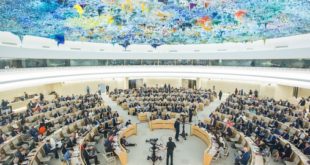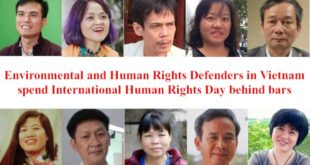GENEVA, 22 June 2016 (VCHR) – Speaking on behalf of the FIDH at the UN Human Rights Council in Geneva, Mr. Võ Văn Ái regretted the “deafening silence” of Vietnam’s Vice-President Đặng Thị Ngọc Thịnh concerning her government’s violent repression of peaceful demonstrations that have broken out all over the country.
“As a member of the UN Human Rights Council, Vietnam should have the courage to openly speak out here about the brutal abuses it is committing against citizens who are simply expressing legitimate concerns about an unprecedented pollution disaster”, said Võ Văn Ái. “In her speech, the Vietnamese Vice-President extolled the use of collaboration and dialogue to improve human rights protection, but at home, it is confrontation and violence that drives the government’s policies.”

Since April 2016, the worst ever ecological catastrophe in Vietnam has hit the central coasts, with over 100 tons of dead fish washed up on the shores. Pollution has ruined the prospects of fishing and aquaculture, which are the local population’s main sources of livelihood. Some 200 kilometres of Central Vietnam’s coastline have been affected in the provinces of Hà Tĩnh, Quảng Bình, Quảng Trị and Thừa Thiên Huế.
This environmental disaster has triggered deep indignation within the Vietnamese population. All over the country, people have mobilized social networks and staged street protests to press the authorities to take a stand. Every Sunday, thousands of demonstrators have gathered in cities all over the country to protest against the government’s lack of transparency and denounce the pollution’s culprits.
The authorities’ sole reaction to public discontent ha been the brutal repression of demonstrations, arbitrarily arresting demonstrators and taking preventive measures including threats and road blocks to stop citizens from leaving their homes to join the protests.
On 8th May 2016, eye-witnesses report that hundreds of demonstrators in Ho Chi Minh City, Nha Trang, Danang and Hanoi were violently beaten and dragged to Police stations where they were placed in custody. On 15th May, in Ho Chi Minh City and Hanoi, hundreds of demonstrators were placed in “rehabilitation centres” which are virtually prisons. On 22nd May, during the visit of US President Obama to Vietnam, the authorities launched a widespread crackdown to prevent public gatherings, placing scores of civil society activists under house arrest and illegally arresting others. On June 5th, Police prevented demonstrations in Hanoi and Ho Chi Minh City and arrested at least 30 activists and human rights defenders.
At the same time, social networks such as Facebook, Instagram and Twitter were blocked. These are the main channels of communication used by demonstrators to mobilize and coordinate the protests.
Although many Vietnamese scientists have identified the cause of the pollution as toxic waste water released into the sea by a massive steel plant in Vung Ang, the government has still not made their conclusions public, and appears to be protecting those responsible.
This nationwide crackdown on demonstrations comes against a backdrop of rising repression in Vietnam following the Communist Party’s XII Congress in January 2016 which brought a new leadership to power dominated by former military and public security elites.
This post is also available in: French Vietnamese
 Quê Me Quê Me: Action for democracy in Vietnam & Vietnam Committee on Human Rights
Quê Me Quê Me: Action for democracy in Vietnam & Vietnam Committee on Human Rights




